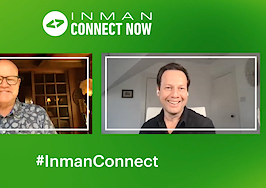“The New Normal” is a multistory Inman series exploring what’s returning to normal after the pandemic fades and what will never be the same. Don’t miss Part 1 What if the brokerage of the future isn’t a brokerage at all?, Part 2 What if real estate agents never go back to the office?, Part 3 What if agent pay was more than just commissions?, Part 5 What if specialization is the answer? and bonus content The New Normal: What if meetings of the future actually saved time? and The New Normal: What if meetings of the future actually saved time? And join us June 15-17 when we take the conversation live at Inman Connect.
The quest to deliver a seamless end-to-end digital transaction has been decades in the making, with brokerages and tech companies battling to release the next game-changing platform. However, many real estate professionals had been resistant to change until the pandemic altered the rules of engagement.
Social distancing restrictions pushed agents, brokers, consumers and everyone in between to lean into the plethora of tech tools at their disposal like never before. State regulators lifted restrictions on e-signatures, e-notarizations and e-closings, and gave buyers and sellers a taste of what a fully paperless transaction could be.
As the world slowly reopens, the industry is facing a crucial choice: go back to traditional ways of doing business or blast full speed into the future, with its opportunities and challenges.
Roadblock 1: Lack of continuity among regulators

Matthew Bizzarro
“COVID brought the industry, especially in New York City, up to the modern times,” The Bizzarro Agency broker-owner Matthew Bizzarro told Inman. “New York, even as one of the most sophisticated cities in the world, has one of the most archaic approval processes, especially when you’re purchasing co-ops.”
“The pandemic moved a lot of this old thinking into modern times. Nobody wants to copy 1,400 pages to bring to a management company or co-op board,” he said. “The silver lining in the pandemic is that it moved the transaction process in the city forward. A lot of major companies now allow secure PDF submissions.”
However, as New York City nears its July 1 reopening, Bizzarro said he’s noticing a frustrating trend.
“I thought we’d moved on [from hardcopies],” he explained. “Lately, as we’ve submitted secure PDF purchase applications [some management companies] are now coming back and saying they require a hardcopy. It’s been done the old way for so long. I don’t think a lot of people know how to pivot.”
RE/MAX Legacy broker-owner Jody Black said he’s facing a similar roadblock in his attempt to provide a totally digital transaction process for his team’s buyers and sellers in Oxford, Mississippi. Black said he’s been successful in digitizing every part of the homebuying and homeselling process, except for e-closings due to state regulations.
“Our attorneys handle our closings here, and what we’re seeing, for the most part, is the attorneys are still sending things to clients and having them overnight them back,” he said. “So we’re not really seeing e-signatures and e-notarizations on the closing side yet but, I think that’s something that’s absolutely crucial for agents and consumers.”

Wendy Forsythe
Fathom Realty Chief Brand Officer Wendy Forsythe said the lack of continuity between state regulators and financial institutions’ approach to e-signatures and e-notarization has been a pain point for Fathom, which offers virtual, cloud-based brokerage services in 29 states and mortgage and title services nationwide.
“In some cases, financial institutions just don’t accept digital signatures. They want to still have wet signatures on the documents,” she said. “So all the other steps in the transaction might be fully remote and fully paperless, but if the bank that you’re getting your mortgage from requires a pen-on-paper signature, that’s it.”
“That’s going to need to change before we could ever have 100 percent, fully-digital paperless transactions,” she added.
According to Notarize, only 34 states have permanent remote online notarization (RON) laws. However, agents and lenders still must follow regulations set by their county’s records office, which may or may not accept eRecordings.
“Unfortunately, each state kind of works in their own little silo,” Realogy Title Group CEO Don Casey explained. “As an example, the majority of the states do allow for RON closings, but here’s the difference: Pennsylvania will only allow e-notarization, but it has to be a licensed notary in Pennsylvania, whereas other states allow for out-of-state notaries.”
“When you look at some centralized notaries like Notarize, their notaries are physically licensed in Virginia and Texas,” he added. “So it’s hard to have consistency and I don’t know that that’ll ever be resolved.”
With that in mind, Casey said the issue is less about goading states and counties into adopting uniform policies and more about helping agents and consumers develop the knowledge base and flexibility needed to have a better transaction experience.
“The tough part is also with the agents,” he explained. “We spend a crazy amount of time training agents, educating them and explaining to them the advantages of [e-notarizations and e-closings].”
“You also have a subset of consumers as well as agents that want ink-signed documents and not do this electronic process,” he added.
Roadblock 2: Differing consumer wants and needs
Bizzarro, Black and Forsythe said their agents embraced the digital transaction process well before the pandemic, which made it easier to make pandemic-induced pivots, including Zoom listing presentations, virtual home open houses, FaceTime walkthroughs, Google Hangout training sessions and drive-thru closings.
“We were very fortunate because we had been using video software for training and communication between ourselves and our agents,” Forsythe said. “They were pretty familiar with being on camera with Zoom meetings and they transitioned pretty quickly to doing that with their clients. ”
“We had many of them tell us like, well, I don’t know why I didn’t do this with my clients before,” she added. “So that was a very interesting kind of a-ha moment.”
Forsythe said consumers come to Fathom for the virtual, cloud-based experience, so they rarely had issues with consumers adapting to an increasingly digital transaction process. However, Bizzarro and Black, who both operate brick-and-mortar offices, have experienced some pushback from consumers who don’t trust the world of electronic signatures and documentation.

Jody Black
“We do run into the occasional folks, who are usually older, that sort of fear technology and they don’t want to have to learn anything new,” Black said. “And the systems and the software that we use doesn’t necessarily require them to learn too much — we just try to explain to them the process.”
“We set up everything for you and all you have to do is touch your phone twice [to complete a task] and it is done,” he added. “Once they realize that it’s not more work for them, usually they can get on board with it.”
Bizzarro said he occasionally has older clients who are skeptical about the safety of a digital transaction. “These personal applications do have a lot of information, but you could argue a PDF or hardcopy could either get hacked or loss,” he said. “So the transition to digital documentation was a little different for some of our older clients clientele, but I found they switched over pretty quick.”

Don Casey
Although a lack of tech-savviness is the main driver behind consumer pushback, Casey said there are times where that isn’t the issue at all. Sometimes, he said, consumers simply prefer an in-person closing experience.
“Our business is very relationship-driven,” he said. “[Some consumers] love the celebration and the culmination of a homebuying experience where they could pop a champagne bottle and exchange the keys. They want that energy and excitement.”
Lastly, Casey said some consumers don’t mind submitting and signing documents digitally, but they still want physical copies at the end of the process.
“We created a product called Valet Closing, where people would literally drive up in the comfort of their car and show us their driver’s license through the window,” he said. “We’d take a picture [of the license] to sign the documents electronically and we would print [the documents] out and then stick them through the window and give them to them.”
“That’s another big thing. Some people want physical copies of things,” we added. “We’ve spent a lot of work creating marketing packages to deliver them, whether it be electronically or physical, but we have to have the flexibility to serve both types of consumers.”
Roadblock 3: Rigid real estate agents and brokers
Although Bizzarro believes paperless transactions are the future, he said agents and brokers must maintain the flexibility to serve all kinds of clients — even those who aren’t anywhere close to giving up their pens, paper and printers.
“Our clients are what led us to make a big shift [to paperless],” he said. “We wanted to give them what they wanted. A lot of them said, ‘I don’t have a printer. Do I need to go to Staples to buy one? Like, how does buying the right toner ink work?'”
“But if someone wants to bring me a 200-page printout, then I’d go get it and maybe scan it after that,” he added. “Real estate is a client business, it’s a service. I opened my agency to be in service to our clients, right? So if you’re not serving your people, you’ve got bigger problems.”
Bizzarro also said he refuses the idea that tech, although useful, is the deciding factor in whether a consumer has a positive transaction experience.
“The new buzzword in real estate is tech and ultimately, a lot of the technology is the same. The difference is just how they’re marketing it,” he explained. “Technology doesn’t make a good agent. Training does, teaching does and creating opportunities does.”
“If you’re a terrible agent, I can give you any tech you want and you’re still going to be a terrible agent,” he added.
Forsythe said Fathom has doubled down on its coaching and training efforts over the past year to help agents gently guide their clients into the digital transaction process, rather than surprise them with several apps and tools to download and use.
“We tell our agents their initial conversations, whether it be a buyer or a seller, should include an explanation of how the transaction will work so the buyer or the seller has that opportunity to ask questions,” she said. “The agent then has the opportunity to explain that we’re a paperless company and what that means.”
“They need the chance to talk through the process, ask questions and get comfortable before it’s actually in their inbox, right?” she added. “Imagine if all of a sudden an agent said, ‘I emailed you a DocuSign and 50 pages of an agreement for you to go through’ and they didn’t explain it to you. You’d be a little overwhelmed about that, right?”
Bizzarro said agents and brokers must remember consumers “don’t know what they don’t know” and take the time to educate them about the transaction process and learn about their specific needs and concerns, so they can choose the correct solution.
“There’s a knowledge gap we need to fill,” he said. “Obviously, there’s so many platforms and so many ways to do things. If you want a PDF, there are like nine ways you could have a PDF, so I don’t think the solution is trying to make everyone use one platform or tool.”
“For example, New York is an awesome, diverse melting pot of everybody, all races, all ages, everything like that, and it’s the same with technology — some people adapt and some people don’t,” he said. “I know that’s not a necessarily interesting insight, but that’s what it is.”
What are the solutions?
While politicians are working on the legislation needed to create a uniform approach to remote online notarizations and e-closings, Forsythe and Casey said are several things real estate and mortgage industry leaders can do now to optimize the experiences for consumers.
“One of the areas that we need to focus on is the immediacy of sharing information across the different parties in the transaction,” she said. ” We have an accepted offer and we get that uploaded into our transaction management software. But then how does it get to the mortgage company? How does it get to the title company? How does it get to the warranty company? How does it get to the appraiser?”
“Let’s say the closing documents aren’t correct because the title company didn’t get an update on an amendment to price, which could delay the closing,” she added. “That’s an area of constant improvement from a software perspective and a digital closing perspective.”
“How do all the different parties talk to each other? We can work on improving that now.”
For Casey, the ultimate game-changer would be getting lenders and investors on the same page. The boom in mortgage originations and refinances have pushed understaffed lenders to the edge, he said, meaning they currently have little time to effectively enact a process change.
“For them to make process changes to accommodate electronic closings, it’d be like changing a car tire as you’re going down the highway and 65 miles an hour,” he said. “But now that things have slowed down a little bit, we’re seeing more and more lenders dedicating time to change in their process.”
In addition to changes at the lender level, Casey said private investors must be able and willing to accept documents electronically. “While the lender dictates the process, the investor dictates how they’ll receive the note, whether it be electronic or physical delivery. So there are opportunities for change there,” he said.
While lenders and investors work on their differences, Casey said his focus is on optimizing the experience for consumers with the tools at his disposal, such as electronic signatures, end-to-end mobile document delivery and video conferencing to recreate the magic of in-person closings.
“We have spent a lot of time working on end-to-end mobile delivery for consumers,” he said. “If you buy a home through Coldwell Banker, you’re going to get all your documents there, and hopefully if you’re using one of our Realogy Title Group companies, you’ll have everything in a mobile setting and I think that is incredibly powerful.”
“We have access to options that weren’t even really thought of five years ago,” he added in reference to virtual closing celebrations for homebuyers. “But today, it’s more common. We have to take advantage of it.”









